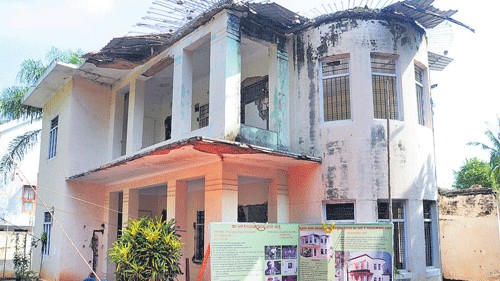
The house of noted writer R K Narayan in Mysuru
DH PHOTO
In the 1940s, R K Narayan, one of India’s greatest writers in English, had a housing crisis in Mysore (now Mysuru). In his autobiography, My Days, he describes how his landlord began dropping in frequently to suggest that Narayan and his family move out. Matters became increasingly urgent and soon, the family was given 15 days to vacate. Thanks to a friend’s timely help, the writer and his extended family moved to another rented house in Lakshmipuram, a nearby locality. But in the meantime, Narayan applied for a plot with the City Trust Board.
The new site was in Yadavagiri, then on the outskirts of the city. There was no proper road, no water and no electricity. But there was a beautiful frangipani tree. And there were lovely views of the surrounding landscape.
Construction began in early 1948. Five years later, after hiccups with funds and headaches with a mendacious contractor, the new house was ready. But the family’s schools, colleges and places of work were all close to Lakshmipuram, and they were loath to move.
Accordingly, Narayan used the Yadavagiri house to work in, “enjoying the company of the family in one and of my books and papers in the other,” he writes.
Narayan himself designed his new study. It was a large, semi-circular room on the first floor, with eight windows that afforded idyllic views. In the pastoral serenity, Narayan spent long hours watching birds on the frangipani tree. Eventually, he had to curtain off the enchanting views so that he could get on with writing.
And write he did. In the solitude of Yadavagiri, Narayan wrote a thousand words a day, churning out novels, numerous short stories, essays and letters.
R K Narayan was born in Chennai on October 10, 1906. Mysuru became his hometown when his father took the post of headmaster at Maharaja High School. Though Narayan loved Bengaluru and created India’s favourite fictional town, Malgudi, during a sojourn there, it was Mysuru that was his hometown. It was also his muse.
He loved watching the evening light dancing on the rippling waters of Kukkarahalli kere. “Nowhere can you view such masterpiece sunsets as in Mysuru,” he wrote. He strolled through the city’s streets and markets, chatted with shopkeepers, and looked at cows outside his windows, and all of it provided grist for his creative mill. Narayan’s stories were rooted in south India and yet, people around the world identified with the motley characters he wrote about in lucid, unfussy prose.
New lease of life
Narayan stayed in Yadavagiri till the early 1990s when his failing health prompted a move to his daughter’s house in Chennai. He died in 2001. Ten years later, his grandchildren sold the Yadavagiri house to a real estate developer. When the new owner began demolishing the house, Mysuru’s residents, writers and others protested against the potential loss of a huge slice of literary history. Eventually, the Mysore Urban Development Authority stepped in, bought the house, restored it, and converted it to a museum.
Narayan had built the large, two-storeyed house to accommodate his large joint family, frozen in several old photographs in the museum. The ground floor has a large hall, a dining room, kitchen, stores and bedrooms, all with beautiful red-oxide flooring.
The writer’s hallowed study is upstairs. Like the rest of the house-museum, the famed bay room is sparsely and indifferently furnished. A low table sits rather incongruently in the centre, its plywood bent and cracked. Large panels of photos from the television series Swami and Friends line the walls. The frangipani tree Narayan loved is gone but other trees grow outside the windows. Ignore the sorry exhibits, and Narayan and his muse are still palpable in his old study.
The museum as it stands now is simultaneously farcical and sad, like something out of one of Narayan’s tragicomedies. Yet, it has tremendous potential. One hopes that Mysuru’s literati can help rejuvenate this forgotten jewel with talks, poetry readings and other literary activities.
(Meera Iyer is the author of ‘Discovering Bengaluru’ and the Convenor of INTACH Bengaluru Chapter.)